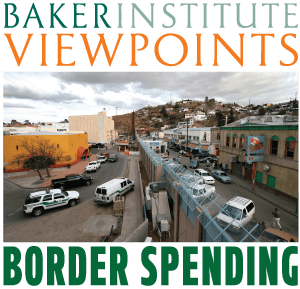Securing the “hyperborder”: U.S.-Mexico border security investments
In the fifth of a six-part Baker Institute Viewpoints series, experts respond to the question: What are the implications of expanding border security?
Investments in border security must be carefully calibrated in order to effectively regulate international flows of people and goods. An increase in spending alone will not necessarily improve control of the border. Rather, any increase in spending must prioritize effective security processes that facilitate legitimate flows and economic exchange across the border. To most people, the border is a frontier that must be hermetically sealed to ward off a range of threats: unauthorized migration, smuggling of contraband and drugs, and potential terrorists. Unfortunately, these individual threats are often conflated. Certainly, transnational criminal enterprises exploit weak and ineffective border security. And certainly, pathways for moving migrants can be used to traffic arms and drugs as well. Cartels and other illicit networks exploit seams in state capacity and often co-mingle in opportunistic ways. Yet dealing with these complex threats by simply building a wall and attempting to seal the border is counterproductive. Continue Reading

